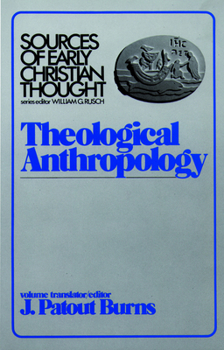Theological Anthropology
Select Format
Select Condition 
Book Overview
"Treated thematically under the headings 'The Gnostic Movement, ' 'Christian Platonism, ' and 'Fourth Century Developments, ' it is possible to see how different ideas of humanity could lead to varieties of theological interpretation."
--Donald Skyes
Format:Paperback
Language:English
ISBN:0800614127
ISBN13:9780800614126
Release Date:September 1981
Publisher:Fortress Press
Length:136 Pages
Weight:0.47 lbs.
Dimensions:0.5" x 5.4" x 8.5"
Customer Reviews
2 ratings
Theological Anthropology in Early Christianity
Published by Thriftbooks.com User , 20 years ago
Man does not disappear in contact with God but, on the contrary, becomes more truly and more freely man. (Karl Rahner)The author & the Book:J. Patout Burns, is a fine patrologist, a founder and past president of the American Patristic Society, 92/93. He authored many articles and books, on the message of the Fathers of the Church, the Economy of Salvation, and the Pelagian Controversy. Theological Anthropology is the third in the: sources of Early Christian Thought, a series of English translations and studies to render the fathers understanding better.The theme of the book is to examine the human person, presenting an overview of coherent patristic thought in Irenaeus of Lyon, Gregory of Nyssa, Pelagius, an Augustine. He offers a selected appetizer from the Holy Fathers on faith issues.Patristic Anthropology:In a concise review, JP Burns explains in plain English early Christian thought and its encounter with Gnostic ideas, and the ascetic movements. He shows how neoplatonism became the carrier of Alexandrine theology, and calls it Christian Platonism.The Apostolic Fathers of the Church developed many interesting apologetic insights into the study of man, an anthropology deeply embedded in scriptures. Based on Genesis, it was developed in a continuity and contrast with Jewish thought. Other aspect which considers man as conceived within the context of early mystery religions, and Alexandrine Neo-Platonism enabled the Fathers to develop their ideas, thus helping them to present a far elaborate biblical and philosophical anthropology. They remained faithful to the revelation on man as given by the OT and Paul's Epistles. Alexandrine anthropology, has already taken far strides of a wider scope based mainly on the fundamental Pauline text (Acts 17:22-31). St. Augustine of Hippo , theory of man, and free will debate with Pelagius, opened up the study of man towards a deeper understanding of man's relationship to God, in the Synergy of salvation. Patristic Anthropology accordingly got tightly linked to patristic soteriology, as best illustrated in Cyril of Alexandria. Irenaeus & man's evolution:The theological anthropology of St. Irenaeus of Lyons (2nd century) however, is not speculative, but got some very original ideas of mans conscious development to meet gods plan for his salvation (through spiritual evolution). It actually reduces itself to a practical explanation of traditional theology, yet, the majority of third century Fathers and Christian writers follow his work Against Heresies, where he writes:"Humanity slowly progresses, approaches perfection, and draws near to the uncreated God. The perfect is the uncreated, God. It was therefore appropriate for humanity first to be made, being made to grow, having grown to be strengthened, being stronger to multiply, having multiplied to recover from illness, having recovered to be glorified, and once glorified to see its Lord. God is the one who is going to be seen; the vision of God produces
Development of Anthropological thoughts in Church History
Published by Thriftbooks.com User , 21 years ago
It is a very good book for anyone who wants to know more on Church History and the stand that the early Church took on various thoughts that developed at that time. The Chapters on Pelagius and Augustine is very interesting to read, especially the way Augustine takes on Pelagius. Also it is very enlightening to know how the Church fathers had to take a stand for the truth of the Bible in light of heresies even in their times.






